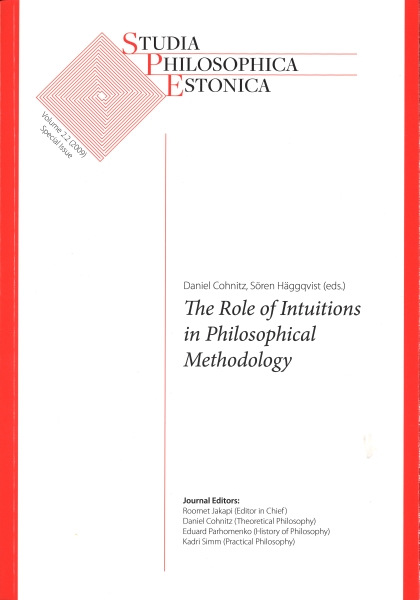Intuitions, Externalism, and Conceptual Analysis
DOI:
https://doi.org/10.12697/spe.2009.2.2.05Keywords:
intuition, semantic externalism, conceptual analysisAbstract
Semantic externalism about a class of expressions is often thought to make conceptual analysis about members of that class impossible. In particular, since externalism about natural kind terms makes the essences of natural kinds empirically discoverable, it seems that mere reflection on one's natural kind concept will not be able to tell one anything substantial about what it is for something to fall under one's natural kind concepts. Many hold the further view that one cannot even know anything substantial about the reference-fixers of one's natural kind concepts by armchair reflection. In this paper I want to question this latter view and claim that, because of the way our standard methodology of doing theories of reference relies on semantic intuitions, typical externalists in fact presuppose that one can know the reference-fixers of one's natural kind concepts by mere armchair reflection. The more interesting question is how substantial such knowledge can be. I also take some steps toward answering this question.
References
Block, N. and Stalnaker, R.(1999). Conceptual analysis, dualism and the explanatory gap, Philosophical Review 108: 1-46.
Byrne, A. and Pryor, J. (2006). Bad intensions, in M.Garcia-Carpintero and J.Macia (eds), The two-dimensionalist framework: foundations and applications, Oxford University Press, Oxford,pp.38-54.
Chalmers, D.J. (1996). The conscious mind, Oxford University Press, Oxford.
Gallois, A. (1996). The world without, the mind within, Cambridge University Press, Cambridge.
Haukioja, J. (2006). Semantic externalism and A Priori self-knowledge, Ratio 19: 176-190.
Häggqvist, S. and Wikforss, A. (2007). Externalism anda posteriori semantics, Erkenntnis 67: 373-386.
Jackson, F. (1998). From metaphysics to ethics: A defence of conceptual analysis, Clarendon Press,Oxford.
Jylkkä, J. (2009). Why Fodor’s theory of concepts fails, Minds and Machines 19:25-46.
Korman, D. (2006). What externalists should say about Dry Earth, Journal of Philosophy 103: 503-520.
Kripke, S. (1980). Naming and necessity, Harvard University Press,Cambridge.
Lewis, D. (1997). Naming the colours, Australasian Journal of Philosophy 75:325-342.
McLaughlin, B. and Tye, M. (1998). Externalism, Twin Earth, and self-knowledge, in C.Wright, B.Smith and C.MacDonald (eds), Knowing our own minds, Oxford University Press, Oxford, pp.285-320.
Nimtz, C. (2004). Two-dimensional and natural kind terms, Synthese 138:125-148.
Nimtz, C. (forthcoming). A new rationalism? Intuitions, modal knowledge and the analysis of concepts.
Putnam, H. (1975). The meaning of “meaning”, Mind, language, and reality, Vol.2 of Philosophical papers, Cambridge University Press, Cambridge, pp.215-271.
Schroeter, L. (2004). The limits of conceptual analysis, Pacific Philosophical Quarterly 85: 425-453.
Wikforss, A .M. (2005). Naming natural kinds, Synthese 145: 65-87.





